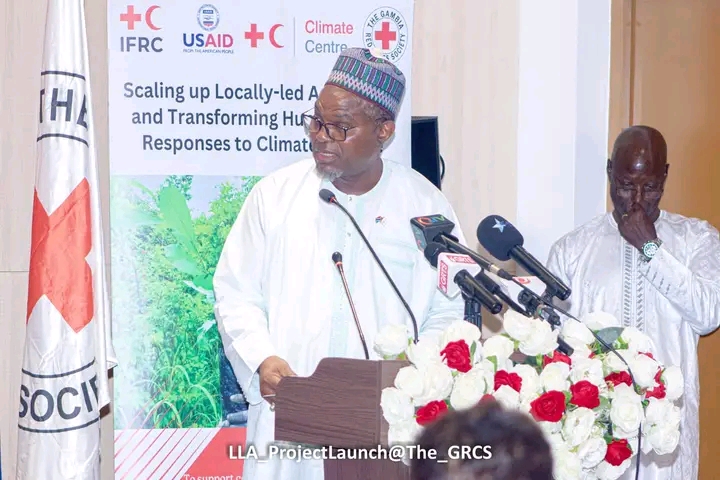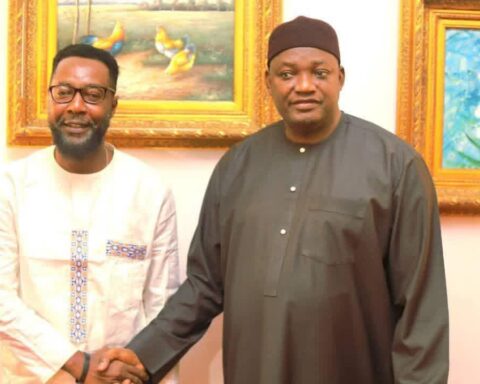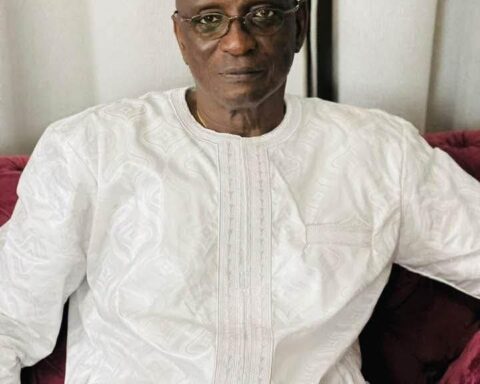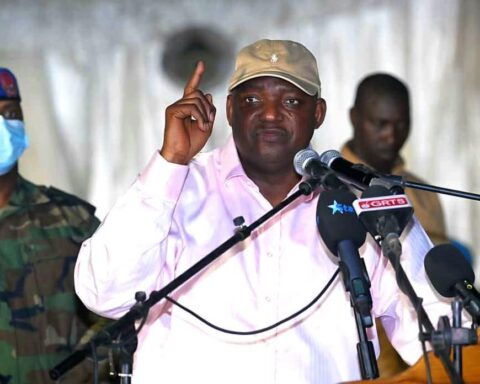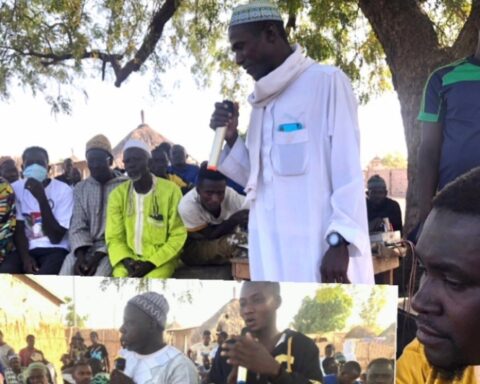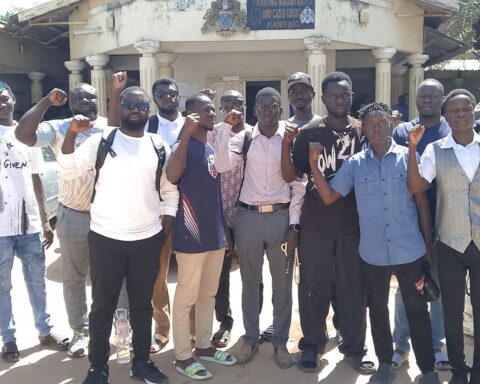Modou Jonga, who served as the Chief Executive Officer (CEO) of the Brikama Area Council (BAC) from 1 November 2019 to 7 February 2024, continued with his admissions before the Local Government Commission of Inquiry.
The Commission was established to investigate financial and administrative operations of the local government councils between May 2018 and January 2023 in a view to enhancing transparency and accountability. So far, the Commission has held institutional hearing on the Basse Area Council, Janjanbureh Area Council, Mansakonko Area Council, and now on the Brikama Area Council. Witnesses, including top financial officers of the councils and the CEOs, have testified and owned up to financial malpractices.
Ex-CEO Modou Jonga on Thursday, 8 August provided a document titled “declaration of intent” dated 13 July 2020 with respect to the decision of the Councilors abstaining themselves from the Council’s activities after the Chairman, Sheriffo Sonko was expelled from the United Democratic Party (UDP). It was signed by sixteen (16) councillors. Jonga testified that from July 2020 to March 2021, there were no council sittings. The law provides that the councils should sit at least once every month. The witness had previously testified that even the period when ex-Chairman Sheriffo Sonko was not exed from UDP, there were some months they did not sit. The reason given was that they would not have an agenda to discuss. The witness submitted the Chairman was responsible for scheduling and organising meetings, adding that the responsibility of the CEO does not include organising council meetings. The letter was admitted in evidence.
The witness further provided a memo dated addressed to the Finance Director and copied to the Chairman, finance managers, rates manager, valued property manager, license manager, market manager, and others. It was dated 18 January 2021 and titled “Revenue Measures for 2021.” The memo was admitted in evidence.
The auditors noted that some non-council vehicles were fueled by the Brikama Area Council. The witness said the fuel allocation was for the vehicles that do Council services. He added that it happened when all council vehicles were busy on collection. The ex-CEO said the decision was done by him personally. He testified that those communities served requested support from the Council, and the Council decided to support them. One of the incidents cited by the Lead Counsel was the fuel allocated to a vehicle in the name of one Buba Baldeh. The witness said it was for the transportation of tires purchased by the Council. The driver was Buba Baldeh. He noted that the delivery of the tires was not clearly spelt out, and therefore, the Council provided 10 litres of fuel to Buba Baldeh to take tires to the Council. He stated that there was a gap in the procurement of the tires. Other vehicles allocated fuel belonged to Abdoulie Fatty and Lamin Cham.
“Majority of the allocations to non-council vehicles were to carry out council works,” the witness said.
The witness reiterated that the reason for doing that was because the Council does not have sufficient vehicles to do that activity for them. He added that it was done in good faith even though it did not follow due process of the law.
The witness was referred to the Financial Manual, which requires appropriation of council resources or funds to only things approved in the budget. Ex-CEO Jonga said there is fuel allocation in the budget, but he was told the allocation was for Council vehicles and not for non-council activities. He agreed but added that it was for the services of the Council because they do not have enough vehicles.
The witness argued that he did not flout the procurement rules. He was asked the procurement method he followed. He said it could be referred to as a framework agreement, but with question and answer, he agreed that the procurement rules were not followed.
The witness was asked about several transactions in which the Council spent huge sums of money to purchase materials without any receipts attached as contained in the audit report for the second quarter of 2022. Lead Counsel Patrick Gomez read the list, and the witness (Modou Jonga) agreed with the audit findings in all those listed procurement activities.
The auditors also found and held that procurement rules were flouted; that the vouchers were not appropriately raised. A total of D1.4 million in 2022 was expended without following the procurement rules.
“Yes, it [flouting of the procurement rules] sometimes happens,” the witness said.
The audit query indicated that the Brikama Area Council was not raising payment vouchers. The CEO is the accounting officer of the Council and the approving authority.The CEO failed to sign most of those payment vouchers as required by law.
The witness testified that at times, he forgets to sign the payment vouchers when dealing with pressing issues in the Council. He added that sometimes he is out of office when those vouchers are raised. The Commission noted that the Director of Finance also did not sign most of the vouchers. The former CEO said this happened when the Director of Finance was out of the office.
“These reasons are not a justification,” Counsel Gomez said.
“Yes, they are not. They should have waited for our signatures,” the witness replied.
“You are employed to follow the procedure. You failed to follow procedures,” the witness answered.
“Yes, Counsel,” Jonga said.
He added: “Sometimes when I am out of office, and they need fuel. They are pressing issues on the table. Sometimes, we forget to sign,” the witness said.
“Do you think it is a good justification?” Counsel Gomez asked.
“No,” the witness answered.
Counsel Gomez told the witness that he should not have been using his discretion over the rules. The witness agreed.
Jonga explained that the right procedure was for the vouchers to be raised, and then approval is given before fuel is supplied. He admitted that in most of the cases, vouchers were raised after the supply of the fuel. The rules were flouted. He was told that it was wrong because vouchers should be raised first. Despite the admission, he disagreed.
The witness was referred to Section 13 of the Local Government Finance and Audit Act titled appropriation of funds. The law prohibits the spending or appropriation of funds without approval. Counsel Gomez told the witness that the law requires him and the Director of Finance to sign vouchers as authority for payment. He was asked if the Director of Finance alone would authorise payment. The witness answered in the negative.
“Is it mandatory for both of you to sign, or is it a matter of discretion?” Gomez asked.
“Both of us must sign,” the witness answered.
“Where only one sign is that correct?” Gomez asked.
“No,” the witness replied.
“Can you as the CEO alone authorise payment?” Gomez asked.
“No,” the witness answered.
“Where you alone authorise payment is that lawful?” Gomez asked.
“No,” the witness answered.
He testified that his action of allowing payments without signing the vouchers or the signature of the Director of Finance was unlawful. His only claim was that it was done in good faith under the circumstance.
He was asked about the D11,350 medical support given to staff without receipts. The witness said the auditors made a mistake as it was payment for refreshment paid to Isatou Keita. He was asked to provide evidence. He requested time.
The Commission noted that the Director of Finance and the witness were each paid D2500 as medical support. The witness said it was payment for their covid-19 test prior to their trip to Kenya to attend a forum. He said he has receipts, and he said he would provide them.
The witness was questioned about the audit findings contained in the 2020 and 2021 audit report by the National Audit Office. The witness requested more time to make his inquires on them. The auditors said the BAC did not present the financial reports, for example books of accounts like collectors’ cash books, bank statements, GTR receipt books, contract files, personal documents, no bank reconciliation and others. He agreed with the auditors and promised to provide the documents.
“It is completely unacceptable,” the witness replied.
The auditors found that there was an understatement of ledgers for D813,000 and overstatement of over D9 million. The witness asked for time to find out.
The witness was asked about the way cash was handled by the collectors. There were no deposit slips for collections for many collectors, and the monies were not traced in 2022. The witness said the matter remained unresolved. He requested time to confirm this from the Council.
The witness provided the updated asset register of the Council for 2023, the signed and authenticated the final audit report for the BAC for 2021 on license collection and a report containing the successes and challenges of the Brikama Area Council. They were all admitted in evidence.
The witness was questioned about the over D1.3 million expenses without the necessary supporting documents. One of them was a D151,000 expense made on the purchase of flights ticket for Sheriffo Sonko and one other. There was no invitation in the payment voucher. The witness said he has a copy of the invitation for the World Urban Forum in Abu Dhabi, UAE. He was told to provide the invitation.
Another expense D99,000 was paid to one Mustapha Manneh for clearing without any documents. The witness said it was for clearing waste from Tanji to Tambana dumpsite. There was only a claim. The witness said the audit finding was correct. He testified that the payment should not have been made. There was no payment voucher number. The same Mustapha Manneh was paid D76,500, D40,000, D94,000, D188,000, D94,500, and many other payments. Another Omar Sidibeh was paid D136,000, D186,000, and D76,000 . The same conclusions were reached. The counsel took time to read the audit findings and the names of the people paid without supporting documents. They only provided a claim, and they were paid. The witness said the payments were for truck hires. The former CEO admitted responsibility for those payments as he stated that they were all unlawful.
The witness was asked about the issue of honorarium payments. The witness said the amount of D2000 was for the payment for coverage for group journalists. He added that it was not honorarium as indicated in the payment voucher. He explained that the reporters who received the money have all signed on the paper. He said they pay honorarium to people who work outside the work hours of the Council. He added that people hired to perform services for the Council are also paid honorarium.
The witness was questioned about the single-sourced procurements of the Brikama Area Council. The witness admitted that they did not follow the procurement rules. He said the requirements for single-sourcing like the thresholds were not followed. Lead Counsel Patrick gave a long list of procurements done using single-sourcing
“The procedures were not followed,” the witness said.
He testified that the purpose for following procedure is to ensure there is value for money and ensure competition among players. He was told by flouting the procedures that he was opening the gate for activities susceptible to favouritism, corruption, and other ills. The witness agreed.
The witness was asked about the loans he gave staff. He said he only has a loan ledger, but there is no record to show the details of the loans. He added that they recover the loan from the monthly salaries of the staff.
“I accept the lapses in the issuance of loan,” the witness said.
He admitted that there were no procedures to be followed as dictated by the Financial Manual.
He was asked about the monthly bank reconciliation statements as required by law. The witness said at the time of audit there were no bank reconciliation statements, but it was done after the audit process by the Director of Finance. He promised to produce them.
He was asked about the issue of drilling of 2 boreholes for the communities Arankone Kunda and Kanjiba and Kanwally for over D1.2 million. He said Kanjiba and Kanwally are cluster communities, and they will share one borehole. The construction of the two boreholes was to take 40 days. The project, at the time of the audit, was not complete. The witness said the delay was caused by the delay in obtaining approval from the National Roads Authority to do underground drill of the road and there was a further delay in obtaining for the single-source contract from the Gambia Public Procurement Authority. The witness said that after obtaining the approvals, the works were completed.
A D700,000 contract was awarded to one Malick Gai, an employee of the Council to renovate mosque and toilet facilities. The witness said it was the decision of the Contracts Committee because he was cheaper in terms of payment.
“How can you convince anyone that there were no kickbacks in this?” Lead Counsel Gomez asked.
“It will be difficult to convince anyone because you need proof to convince someone,” the witness said.
“Don’t you think there was the issue of conflict of interest?” Gomez asked.
“Yes, we oversight the issue of conflict of interest,” the witness said.
“You did not follow any procurement rules and regulations. Who did you take this decision with?” Gomez asked.
The witness said the issue of the mosque was discussed in a Contracts Committee. He added that the Director of Planning was not present in that meeting. He was asked to provide the minutes of the meetings. The witness admitted that the decision of the Contracts Committee flouted the procurement rules.
Commissioner Alagie Sillah put to the witness that it was wrong to contract and pay a council staff to do a council job.
“It was wrong to contract him,” the witness answered.
The witness referred to the Local Government Service Rules 2003 (Regulations 0702), which provides that the council resources should not be used in carrying out such contractual jobs. The witness answered that the rules were flouted.
The witness will reappear today (Monday)to continue with his testimony.


